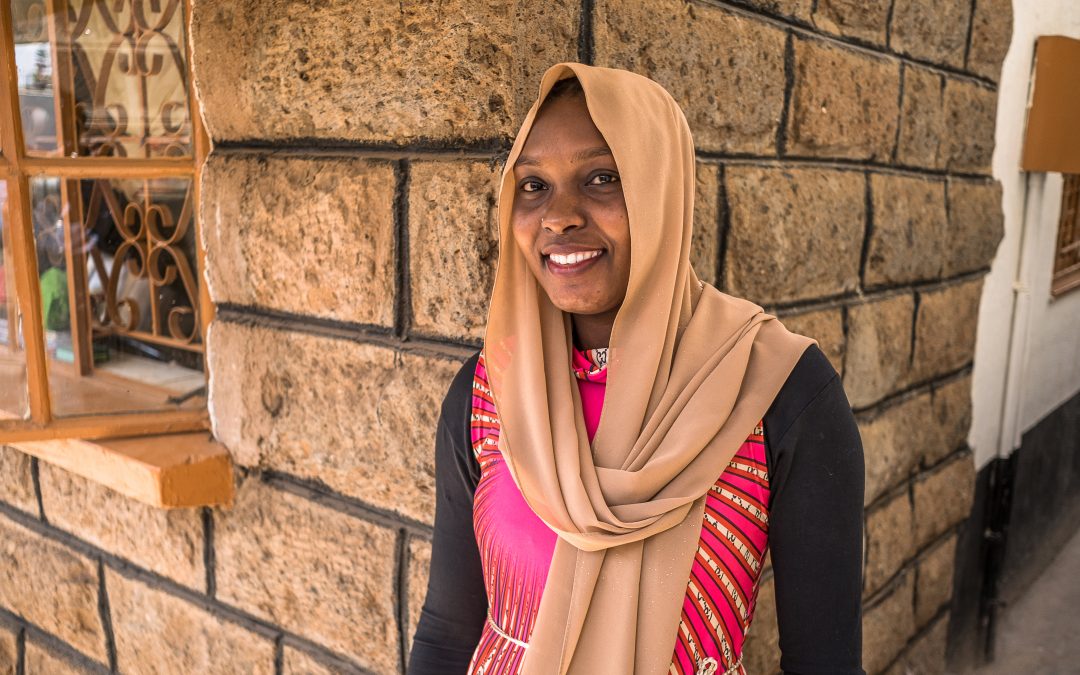Yasmin Mohammed, 26, is the founder of the community-based organisation Superb in Kibera, Nairobi, Kenya and also a menstrual health champion. She shared her experience with how the COVID-19 pandemic has affected her work and community.
What has changed since the beginning of the pandemic?
Access to sexual and reproductive health (SRH) services has reduced since the beginning of the COVID-19 pandemic. The government is focussing on quarantine and isolation measures, and forgetting that women and girls need SRH services.
Before COVID-19, we used to share our knowledge and information on SRH services at mass gatherings where we met with youths, women and girls to share, but now with the government directive we have not been able to meet and we are afraid the repercussions of that. If girls don’t have comprehensive knowledge about SRHR, in three months from now, many will end up getting pregnant because they are not able to make informed decisions about their bodies and their lives.
We have youth-friendly services, but health care practitioners are anxious about COVID-19 and are not able to accommodate many patients in their health care facilities because of social distancing rules.
Day-to-day access to SRH services is very limited. Initially, we had maybe nine or ten young people or women who were able to access SRH services but now it is more limited – people are not going to health care facilities because the health care practitioners are not “friendly” and because they are afraid. As SRH activists, we are looking at different approaches and interventions that we could adapt to so that young people and women can have access to SRH services anywhere.
What I would like to see and how I would like to ensure that our rights are being protected during the COVID-19 pandemic – first and foremost, we need to do a lot of advocacy so the government will see that having SRH services is essential. The people in government think these services are non-essential and, if the services are not addressed well, we will have challenges even after COVID-19.
We are adopting new approaches to ensure that young people and women have access to the information they need, including through social media and local community radio stations. We usually go to the stations and speak on SRH topics. We also want to see how COVID-19 has affected women and young people in relation to their sexual and reproductive health and rights (SRHR). We also want to ensure that our rights are protected. The government must put mechanisms in place to ensure that women and young people have access to contraceptives by making sure that the health care facilities that are in informal settlements have SRHR services.
What I would like to see during the COVID-19 pandemic is that the government should ensure that young people and women have access to youth-friendly SRH services and access to contraceptives.

Yasmin Mohammed, photographed by Brian Otieno for DSW.
How do you see the future?
How I see the future of other women and girls now is that if we do not address the challenges that this they are going through now, there will be consequences – for instance, girls are now at home and not in school, and they are exposed to so much sexual exploitation. If we don’t give them information about SRH, they will make worse decisions and there will be many unintended pregnancies, school dropouts, and early marriages. We need to advocate more for SRHR so that these young girls and boys will be able to make informed decisions so even if COVID-19 is over, they will go back to school with little or no teenage pregnancy. Failing to address this will result in so many challenges and issues, which we will have to solve.
What is your advice for young women and girls?
My advice to women and girls is not to let COVID-19 be an excuse to make us more vulnerable. Let’s seek out information on SRH and let’s not be afraid of visiting health care facilities to access SRH services like contraceptives and to ask health care experts questions about reproductive health. Young girls who are at home and doing nothing, seek out SRH information and mentorship programs and do not let your male counterparts take advantage of you. If you cannot access menstrual products, do not opt for an unhealthy alternative because it could endanger your health.
Photographs and videos by Brian Otieno for DSW.
